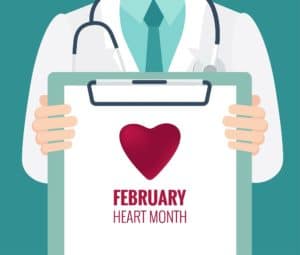 Every February, we celebrate Heart Health Month to raise awareness of how we can both evaluate our risk for heart disease as well as what we can do to reduce that risk. While it may seem out of character to hear your dentist in Silverdale talk about heart health, the truth is, there is a direct link between poor oral health and an increased risk of heart disease.
Every February, we celebrate Heart Health Month to raise awareness of how we can both evaluate our risk for heart disease as well as what we can do to reduce that risk. While it may seem out of character to hear your dentist in Silverdale talk about heart health, the truth is, there is a direct link between poor oral health and an increased risk of heart disease.
Gum Disease & Heart Disease
The main concern between oral health and heart disease is gum disease. Gum disease is an infection in the gum tissues that, if left untreated, could lead to painful gums and even tooth loss. But that’s not all. Gum disease has also been linked to an increased risk of heart attack.
When infection infiltrates our gums, it also has a direct pathway to the bloodstream. And when infection enters the blood, your body reacts by producing an overabundance of C-Reactive Protein (CRP). Elevated levels of CRP can cause:
- inflamed arteries
- blood clots
- heart attacks
- strokes
Too much CRP may even be one of the top warning signs of a heart attack. In fact, according to The New England Journal of Medicine, elevated CRP levels can be more accurate at predicting a heart attack than high cholesterol.
What Causes Gum Disease?
Now that we know that gum disease can affect more than just your oral health, let’s take a closer look at what causes it in the first place. Gum disease is usually caused by a buildup of plaque brought on by poor oral hygiene. The first stage of gum disease is known as gingivitis. Quick intervention from your dentist in Silverdale can help the problem from becoming more serious, but if gingivitis isn’t treated it can quickly progress and put overall health at risk.
Gum disease can come on suddenly, and sometimes without any symptoms. Other times, symptoms are mistaken as normal and treatment isn’t sought. This is one reason why seeing your dentist regularly is so important. Your dental team will be able to diagnose gum disease early if you visit every six months, making treatment more successful.
Symptoms of Gum Disease
Some of the most common signs of gum disease include:
- Bleeding when brushing or flossing
- Puffiness or tenderness of the gums
- Halitosis (bad breath)
- Loose-feeling teeth
If you do notice any of those symptoms, contact your Silverdale dentist to schedule an appointment as soon as you can.
Gum disease can more than double your risk of suffering a fatal heart attack or stroke. Reduce your risk by brushing twice a day, flossing once a day, and of course, seeing your dentist every six months or as recommended. Other steps you can take to protect yourself include not smoking and eating a well-balanced diet.

